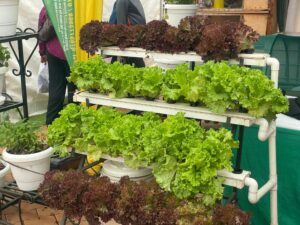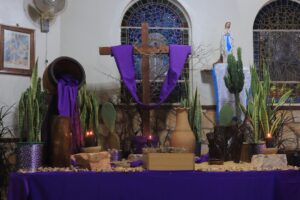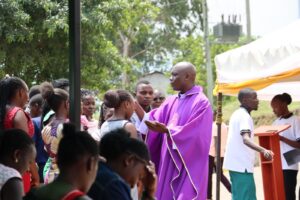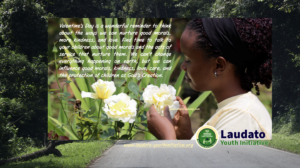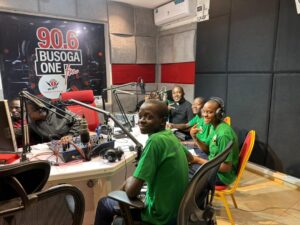Fr. Leonard Olobo, CSC – Chair Board John Paul, II Justice and Peace Centre – Kampala while speaking to hundred of young people gathered for the “Laudato Si Green Festival” at Holy Cross Lake View S.S.S in Jinja.
Dear brothers and sisters in Christ,
We gather today with hearts full of concern for our common home and with a desire to be bearers of peace and hope. The world groans under the weight of ecological destruction, conflict, and despair. Yet as people of faith, we are called not to surrender to hopelessness but to sow seeds—small acts, words, and choices that nurture life, restore the earth, and rekindle hope.
As Pope Francis reminds us in Laudato Si,
“Hope would have us recognize that there is always a way out, that we can always redirect our steps, that we can always do something to solve our problems” (LS 61).

Recognizing the Wounds of Creation
We begin by listening to what Pope Francis calls “the cry of the earth and the cry of the poor.” It’s from his homily on the World Day of the Poor on November 13, 2022.
- The rivers are polluted. Forests are vanishing.
- The climate is changing. Droughts and floods destroy livelihoods.
- Species are going extinct at alarming rates.
- Our cities and towns are choking under the weight of the uncollected garbage and polythene waste.
- And the most vulnerable, especially in Africa, suffer the consequences.
This is not just a scientific issue; it is a spiritual and moral crisis.
We have turned God’s garden into a marketplace, a battlefield, and a wasteland.
Saint Paul says in Romans 8:22:
“The whole creation has been groaning as in the pains of childbirth.”
The world is in labor, crying out for new life, for peace, and hope.
We must acknowledge this reality, not with despair, but with a resolve to be part of the healing.
Becoming Sowers of Peace
Jesus said,
“Blessed are the peacemakers, for they shall be called children of God” (Matthew 5:9).
To sow peace is not just to avoid violence, but to actively build relationships with one another and with the earth.

How can we sow seeds of peace for creation?
- By reducing waste and choosing simplicity over excess.
- By treating nature not as an object to dominate, but as a gift to cherish.
- By fostering dialogue, not just among people, but between humanity and the natural world.
Peacemaking includes economic justice, food security, access to clean water, and land rights. These are not just environmental issues; they are deeply spiritual matters. The poor, who depend most on creation, suffer most when it is destroyed.
To care for creation is to care for our brothers and sisters.
Planting Seeds of Hope
Sometimes we think hope means pretending everything is fine. It’s not. Real hope means knowing things are hard, but believing they can get better with God’s help and our action.
The Bible says,
“The Lord’s love never ends; His mercy is new every morning” (Lamentations 3:22-23).
In exercising our agency, it should be clear to us that:
- Every time we throw trash in the bin instead of on the street or our school compounds, that’s hope.
- Whenever we speak up for someone who’s being bullied or left out, that’s hope.
- When we turn off lights or save water, that’s hope.
- And whenever we choose to carry our own water bottles instead of buying bottled water and then littering the environment with discarded bottles, that is hope.
Therefore:
- Every tree we plant is a sign of trust.
- Every habit we change in favor of Mother Earth becomes a testimony to future generations.
- Every prayer we raise is a plea for healing and restoration of Mother Earth.
As Pope John Paul II once said,
“Even when the night is darkest, we can always light a candle of hope.”
Let us light that candle in our homes, schools, parishes, and places of worship.
Let us educate children, our siblings, our peers, and schoolmates to love nature. More importantly, let us use our voices, social media, art, and preaching to defend creation.
Small actions, done in love, bear abundant fruit. We may not see the harvest, but we are called to sow the seed.
Living as Co-Creators with God
In Genesis, God gives us the task to
“till and keep” the earth (Gen 2:18).
We are not masters of creation; we are stewards, co-creators, and caretakers.
“Quote from Francis of Assisi is from St. Francis! Canticle of Creatures”
As Saint Francis of Assisi reminds us, we are brothers and sisters to all creatures, not owners, but part of a sacred community of life. Let us remind ourselves of this central vocation.
One person can make a difference, but a group can move mountains. May we look around our schools, your neighborhoods, your parishes, our friends and ask—what can we do together?
- Join the Laudato Si Club or Start a cleanup group?
- Campaign for less plastic at school, at home, and in our neighborhoods?
- Create posters or art that inspire care for creation?
- Raise awareness online?
A Call to Action and Prayer
Let us go forward as people of peace and hope.
- Let us plant trees and protect the waters.
- Let us find alternatives to the plastics that choke Mother Earth.
- Let us explore proper ways to manage our waste.
- Let us fight and reject corruption in environmental-related matters.
- Let us strive to influence the legal and policy frameworks on the environment.
- Let us teach those in our network and with whom we interact daily to love the earth.
- Let us pray, act, and advocate for a world where creation is not plundered but protected.
Let us sow peace with our lives and plant hope with our actions. Together, in Christ, we can renew the face of the earth.










